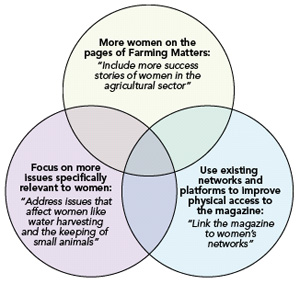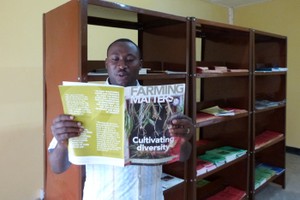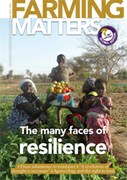At the start of 2014, we asked you to give us feedback on Farming Matters, and we thank all those hundreds of you who responded. You have helped by providing us with findings that are a useful resource for both reflection and action. To inform our future strategies and keep satisfying your needs, we asked how to encourage you to contribute, best manage the transition towards greater online content, improve outreach through social media, and how to better engage women and youth.
Survey respondents
More than half of those who responded were from sub-Saharan Africa, and almost a quarter were from Asia. But only 16% were women, and only 12% were young people.
Farming Matters is unique
The magazine focuses on family farmers yet the magazine covers many related issues both local and global. You told us that this breadth is unique and appealing, and that Farming Matters is down to earth and applicable to your work.
A ‘cloud’ was generated, where the size of the word corresponds to the number of times it was mentioned by respondents, the key message being ‘practical information on farming’.
One important reason articles remain practical is thanks to you, the readers, who continue to write and submit articles that are grounded on the real life experiences of farmers and others.
We encourage you to keep writing
We treasure the written participation of our readers. However, the survey highlighted some of the barriers that stopped many of you from writing and submitting articles. The three most common reasons were;
- (a) not feeling like an expert,
- (b) not realising that you could contribute, and
- (c) not feeling comfortable writing an article.
You are very welcome to contribute and we are not only looking for experts, all perspectives and stories are valuable (see the invitation for articles on inside the front cover).
The digital transition

The most favoured digital format is pdf, and about one quarter of the surveyed readers are printing out at least part of the magazine, or sometimes all of it. One in six people use the Farming Matters Android ‘app’, and half of those not currently reading Farming Matters online in some way or form, plan to do so in the future. The biggest single barrier to reading online both now and in the future was reliable internet access, especially amongst our sub-Saharan African readers. But more than half of those who struggle to get online now are optimistic that internet access will improve in the future.
Two thirds of respondents are active on Facebook, Twitter or both, and a quarter of them use these platforms to follow ILEIA or the AgriCultures Network. However, about half did not know that it was possible to follow us in this way, and a number of you suggested our social media presence could be improved with more frequent postings.
Key messages from women and youth
The visibility of role models on the pages of Farming Matters is important for both women and youth, and both groups would like to see more articles that focus on issues especially relevant to their own situations.
As suggested by the young respondents, this would be possible with a greater youth input. We agree, so please get in touch with your ideas! A practical message from the women who responded is to use existing networks and platforms to improve physical access to the magazine.
Putting Farming Matters to work
Farming Matters is not only widely read but also widely shared. Half of the surveyed readers share the magazine with 10 people or more. The ways that information from Farming Matters is used depends in part on the readers occupations.
For example, development field workers tend to share information from the magazine within rural communities, try out approaches or technologies, or use the content for training.
Researchers, however, use information from Farming Matters mostly as inspiration for further research, whereas decision makers/administrators tend to use the information to stimulate discussions within their organisation or with other stakeholders.
An ongoing process
This is a small window into the whole set of results that emerged from the readers’ survey. We have analysed all of the results in detail and we thank you once more for the useful feedback that contributes to the resilience of Farming Matters.
Madeleine Florin and Harmony Folz


